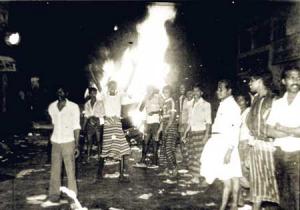Black July - We remember July 1983 which birthed Institutionalization of Sinhala Militarized Oppression of Tamils - TGTE
Sri Lanka's Anti - Tamil Pogrom of July 1983
COLOMBO, SRI LANKA, July 22, 2016 /EINPresswire.com/ -- The anti-Tamil pogrom of July 1983 killed up to 3000 Tamils, internally displaced 150,000 and destroyed 90% of Tamil industrial infrastructure, all in a matter of 10 days. This pogrom was sanctioned and organized by the State and never condemned by the leader of the country, President Jayewardene. The anti-Tamil mob violence was under the direction and patronage of the ruling elite, UNP ministers, Cyril Mathew and Gamini Dissanayake.Paul Seighart, chairperson of the British section of the International Commission of Jurists (ICJ), who was sent to Sri Lanka by the ICJ on a fact-finding mission, wrote that the anti-Tamil violence of July 1983 was “a series of deliberate acts, executed in accordance with a concerted plan, conceived and organised well in advance”. The Review, an ICJ publication, declared that the violence “amounted to acts of genocide”. (http://sangam.org/remembering-black-july/ )
Mob violence against large numbers of Tamils has been a regular occurrence in Sri Lanka since the Gal Oya massacre of 146 Tamil peasants, including children, on June 5, 1956, which coincided with - and was the result of - the peaceful Galle Face satyagraha protest of the Tamil leadership against the ‘Sinhala Only’ Bill.
More than half a century later, not a single person involved in the Gal Oya massacre has ever been brought to justice.
The connection between peaceful Tamil protest and its suppression by military means was dramatically demonstrated when a permanent military presence was established in the North following the violent elimination of the 1960 satyagraha protests.
In August 1983, due to the outcry over the pogrom the previous month, the ruling party UNP's ambassador at the UN Sub Commission pledged, "The Sri Lankan authorities… would leave no stone unturned to bring justice to all those responsible for killings, violence and acts of destruction no matter who they were and regardless of their status, ideology or political alignments. There would be no exception.”
Thus far, there has been no investigation and no prosecution for these mass killings against Tamils, planned and executed by members of the State itself. During this pogrom, President Jayewardene not only took no action to stem the violence, he told London's 'Daily Telegraph,' on July 26 "I am not worried about the opinion of the Jaffna people... now we cannot think of them, not about their lives or their opinion... the more you put pressure in the north, the happier the Sinhala people will be here... Really if I starve the Tamils out, the Sinhala people will be happy."
President Jayewardene's statement, which had undoubtedly been also made in the local press, amounted to a 'license to kill' the Tamils. It also demonstrated that the Tamils constitute a distinct nation, separate from that of the President of the country. In a perverse way, it validated Tamil nationhood with its noting of the distinction between the Tamil and Sinhala 'peoples.'
The July 1983 anti-Tamil pogrom was brought to a halt only through the stern warning of India.
The government institutionalized the military and its intelligence operations, directed particularly against the Tamils, through the establishment of the national security ministry and the formation of the Special Task Force (STF) following the pogrom.
The act of anti-Tamil genocide at Mullivaaikkal and surroundings in the winter and spring of 2009 in which 146,000 people had to be accounted for was the culmination of the Sinhala military and military intelligence operations against the Tamils institutionalized after 1983. The Tamil Centre for Human Rights has documented the killing of tens of thousands of Tamils by Security forces from 1956 to 2007 http://sangam.org/2007/11/Killed_1956_2007.php?uid=2619
Since the end of the war, the military oppression of the Tamil areas has continued, even in the face of the September 2015 UN Human Rights Council Resolution which called specifically for security sector reform and the institutional reform which will lead to non-recurrence, one of the essential elements of transitional justice. According to the Sri Lanka Ministry of Defense’s website (accessed June 2016) 17 of 20 the country's army divisions are in the traditionally Tamil areas of the NorthEast. Much of the North has one Sinhalese soldier for every 5 Tamil civilians (International Crisis Group - http://blog.crisisgroup.org/asia/2014/03/25/the-forever-war-military-control-in-sri-lankas-north/), and the British Tamil Forum calculates that in the North alone the military holds 68,000 acres of private land owned by Tamils.
Rather than demilitarize at the end of the war, when there is no external threat whatsoever, both the military's manpower and budget in Sri Lanka has actually been increased. The military and its intelligence wing are a ubiquitous and intrusive element in Tamil lives and affairs. The military is involved in commerce, sells agricultural produce, runs tourist hotels, teaches pre-school, and insists on being present at the most intimate family ceremonies.
Black July of 1983 and the subsequent Institutionalization of military oppression, and the resolution of the Tamil National Question remain deeply interconnected and enmeshed in the chauvinistic Sinhala national mindset.
Demilitarization of the Tamil homeland is a prerequisite for accountability and for the political resolution of the Tamil National Question.
On this Black July remembrance day, Eelam Tamils call upon all peace loving people in the world to listen to our cry for freedom, justice and peace.
Transnational Government of Tamil Eelam
TGTE
+12122902925
email us here

